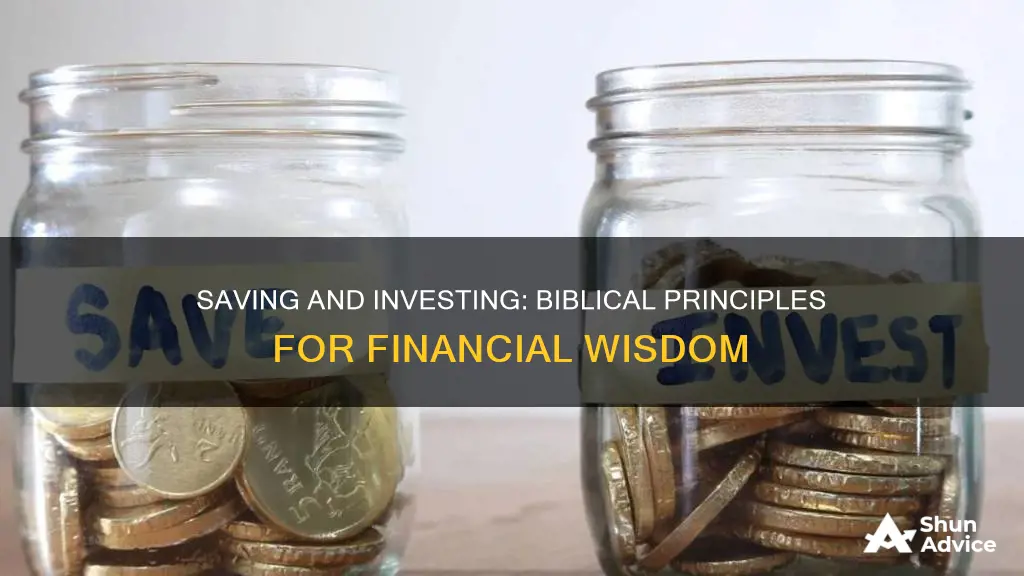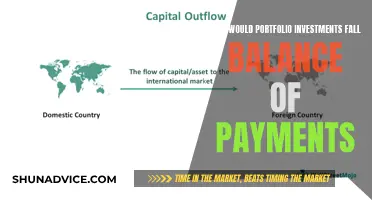
The Bible offers a myriad of verses that give wisdom about how to deal with money. While it is important to note that the Bible tells us not to put our hopes in wealth and riches, but in God, it also encourages us to plan ahead for the future, save, invest and diversify our holdings.
Getting Good Counsel
It is important to seek advice from others when investing. Without good counsel, your plans are more likely to fail.
Planning Ahead
The Bible makes it clear that it is wise to work hard and plan for the future. Don't be caught unprepared because you failed to plan ahead.
Saving and Investing
Saving for a rainy day and putting your money to work to multiply it is a wise thing to do.
Diversifying
Diversifying your holdings can protect you from the unknown. None of us knows what will happen from one day to the next, in our lives or in the stock market.
Ethical Investing
When investing, we are called to be faithful and to deal justly. Invest ethically and in a way that doesn't harm others.
Not Loving Money
Be careful not to love money. It is good to plan ahead and provide for your family, but don't allow money to become your ultimate goal. Instead, set your sights on Christ and his example.
| Characteristics | Values |
|---|---|
| Getting good counsel | Proverbs 15:22, Proverbs 19:2, Proverbs 12:15, Proverbs 28:26, Proverbs 24:6 |
| Planning ahead | Proverbs 13:16, Luke 14:28-30, Proverbs 6:6-8, Proverbs 16:9, Proverbs 27:23, Proverbs 14:29, Proverbs 24:27 |
| Saving and investing | Proverbs 21:20, Proverbs 21:5, Matthew 25:14-30, Genesis 41:34-36, 1 Corinthians 16:2, Proverbs 27:12, Proverbs 30:24-25 |
| Diversifying | James 4:13-15, Ecclesiastes 11:2 |
| Ethical investing | Ecclesiastes 12:13, Proverbs 13:11, Proverbs 28:20, Proverbs 16:8, Leviticus 19:13, Psalm 112:5, Proverbs 22:16, Luke 16:10 |
What You'll Learn

Saving for future needs is biblical
Saving for future needs is not only practical but also biblical. The Bible teaches that saving for future needs is not only possible but also wise. It is possible to save for the future while also being "rich toward God" by "storing up treasures in heaven" (Luke 12:21; Matt. 6:19–21).
Honouring God and Serving Others
Saving honours God because it values money as a gift that he has given. Wise saving demonstrates the importance of stewarding God's gifts (Luke 12:47–48). It puts you in a better position to help with important needs as they arise (Eph. 4:28) and allows you to leave an inheritance, blessing your heirs so they can be a blessing to others (Prov. 13:22).
Avoiding Procrastination
The Bible warns against procrastination when it comes to saving. By failing to save early, you miss out on the financial benefits of compound interest. The Bible encourages saving early, even if it is a small amount, to gain momentum over time (Matt. 25:27).
Wise Investing
The Bible encourages wise investing, which is about putting money into real businesses that employ people and deliver products or services to customers (Prov. 31:10–31; Eccl. 11:1–6). It is important to invest wisely and avoid get-rich-quick schemes (Prov. 28:19; 1 Tim. 6:10).
Temptations of Saving
The Bible cautions against saving for the wrong reasons, such as fear, greed, or a desire for independence from God and others (1 Tim. 6:17; Prov. 1:19; Mark 8:36; Luke 12:15). It is important to find the right balance between setting aside and investing wisely for the future, while also remaining dependent on God and generous towards others.
Saving and Investing: Your Path to Financial Freedom
You may want to see also

Saving honours God and serves others
The Bible teaches that saving is not a selfish act but rather a way to honour God. Saving is about stewarding God's gifts wisely, demonstrating that we value money as a gift from Him (James 1:16-17). By saving, we put ourselves in a better position to help others (Ephesians 4:28) and can respond quickly and generously when needs arise (Proverbs 3:27).
Saving can also allow us to leave an inheritance for our heirs, blessing them so that they, in turn, can be a blessing to others (Proverbs 13:22). This act of saving and passing on wealth to future generations is further emphasised in Proverbs 13:22b, which states, "A good person leaves an inheritance for their children's children, but a sinner's wealth is stored up for the righteous."
Additionally, saving can be an act of worship, demonstrating that our hope is in God, not money (1 Timothy 6:17). As the Apostle Paul writes, "As for the rich in this present age, charge them not to be haughty, nor to set their hopes on the uncertainty of riches, but on God, who richly provides us with everything to enjoy" (1 Timothy 6:17).
In summary, saving is not just about our personal gain but also about honouring God and serving others. It is a way to demonstrate our trust in Him as the ultimate provider and our willingness to manage the resources He has entrusted to us wisely and generously.
Explore Saving and Investment Options for Your Future
You may want to see also

Procrastination is a mistake
We all tend to put things off, but by delaying saving for retirement, you miss out on one of the most powerful financial tools: compound interest, or earning interest on interest.
Many people delay saving because they expect to have more disposable income in the future, or because they have more pressing needs, such as debt payments, low wages, or healthcare expenses. However, saving for retirement later means your money has less time to grow.
For example, if you start saving today, you may only need to contribute a small amount to reach your retirement goals. But if you delay, you will have to contribute much more to end up with the same amount.
So, start by doing what you can and build momentum over time. Even if you can only save a small amount each month, the power of compound interest means that your savings will grow over time.
> "Trust in the Lord with all your heart, and do not lean on your own understanding. In all your ways acknowledge him, and he will make straight your paths." Proverbs 3:5-6
> "Go to the ant, O sluggard; consider her ways, and be wise. Without having any chief, officer, or ruler, she prepares her bread in summer and gathers her food in harvest." Proverbs 6:6-8
> "The plans of the diligent lead surely to abundance, but everyone who is hasty comes only to poverty." Proverbs 21:5
> "Prepare your work outside; get everything ready for yourself in the field, and after that build your house." Proverbs 24:27
> "For which of you, desiring to build a tower, does not first sit down and count the cost, whether he has enough to complete it? Luke 14:28-30
National Saving Scheme: Smart Investment Strategies
You may want to see also

Debt is debilitating
The Bible teaches that it's possible to save and invest wisely for the future while also being "rich toward God" by "storing up treasures in heaven" (Luke 12:21; Matt. 6:19–21). Saving honours God because it values money as a gift from Him (James 1:16–17).
The Bible provides a lot of guidance on how Christians should conduct their investment and money-saving practices. Here are some verses to consider:
- "Wealth gained hastily will dwindle, but whoever gathers little by little will increase it" (Proverbs 13:11)
- "The plans of the diligent lead surely to abundance, but everyone who is hasty comes only to poverty" (Proverbs 21:5)
- "Better is a little with righteousness than great revenues with injustice" (Proverbs 16:8)
- "A faithful man will abound with blessings, but whoever hastens to be rich will not go unpunished" (Proverbs 28:20)
- "Whoever trusts in his riches will fall, but the righteous will flourish like a green leaf" (Proverbs 11:28)
- "Whoever loves pleasure will be a poor man; he who loves wine and oil will not be rich" (Proverbs 21:17)
These verses emphasise that God wants Christians to accumulate wealth slowly, justly, and without compromising their morals. It's important to avoid the temptation of get-rich-quick schemes and to seek advice from trusted and experienced advisors.
Additionally, while it's good to save, invest, and multiply holdings, it's also crucial to have diverse holdings to reduce risk.
Saving and Investing: Strategies for Future Financial Goals
You may want to see also

Wise investing is right and good
The Bible encourages wise investing, as opposed to speculating, which is akin to gambling on future events. It is about putting money into real businesses that employ people and deliver products or services to customers.
Gain Wealth Slowly
"Wealth gained hastily will dwindle, but whoever gathers little by little will increase it" (Proverbs 13:11). This principle encourages a slow and steady approach to investing. It is better to grow wealth slowly and patiently, avoiding greed and immediate gains.
Gain Wealth Justly
"Better is a little with righteousness than great revenues with injustice" (Proverbs 16:8). These verses emphasise gaining wealth in a moral and ethical way. The Bible warns against profiting through bribes, deceit, and theft. It is important to build wealth without compromising one's morals.
Don't Trust in Wealth
"Whoever trusts in his riches will fall, but the righteous will flourish like a green leaf" (Proverbs 11:28). This is a counter-cultural principle. While it is good to plan and provide for the future, money should not become the ultimate goal. Christians are called to treasure and enjoy Jesus above all else.
In conclusion, wise investing is about growing wealth slowly, justly, and without making it an idol. It is about stewarding one's resources well and keeping God at the centre of financial decisions.
Certificate of Deposit: Investment or Savings?
You may want to see also
Frequently asked questions
The Bible encourages saving for future needs, honouring God and serving others, and avoiding procrastination.
The Bible encourages wise investing, seeking professional advice, avoiding get-rich-quick schemes, diversifying investments, and glorifying God in investments.
The Bible encourages Christians to gain wealth slowly, justly, and without trusting in it.







